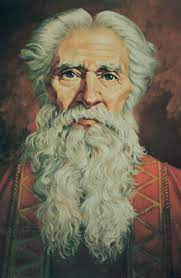The Redemption and Restoration of Isra’el
40:1 to 66:24
The Bible has 66 books, 39 books in the TaNaKh and 27 books in the B’rit Chadashah. While both Covenants have elements of both judgment and hope, the TaNaKh speaks forcefully about inevitable judgment and the New Covenant speaks forcefully about redemption and return. This is exactly what we have in the book of Isaiah. There are 66 chapters, 39 chapters speak forcefully of inevitable judgment, while 27 chapters, 40 through 66, speak just as forcefully of inevitable redemption and return.
The first 39 chapters of Isaiah were written during the time that the Assyrian Empire was the main threat against the kingdom of Judah. The recurring theme in those chapters is that ADONAI could be trusted in the face of the threats from surrounding nations. Nevertheless, the people of Isra’el were continually tempted to trust other nations to help them. God told them that those nations would fail them and they would be destroyed, sometimes from the very nation she had trusted for help (8:5-8, 30:1-5). But Isaiah declared that even after their well-earned destruction, God would not abandon them, but deliver them (9:2-7, 30:9-33).
The second part of Isaiah, Chapters 40 to 66, are written in a more prophetic format in that Isaiah is projecting himself either 150 years into the future when the Jews are in the Babylonian captivity, or into the end times during the Great Tribulation and Messianic Kingdom. It is not unusual for Isaiah to go back and forth between the two dispensations. These chapters are the tenth major section, the largest of them all comprising 27 chapters. The theme of these chapters is the redemption and restoration of Isra’el, and in them ADONAI displays that His trustworthiness does not end at the point of disobedience. The Israelites did not deserve it and God was not required to deliver them. Yet, ADONAI did it anyway. Even though He knew they would desert Him, He promised in advance to redeem them without money and without cost (55:1b).
Isaiah 40-54 and 60-66 has constant illusions to the story of the Exodus and presents Isra’el’sfuture salvation as a Second Exodus (see the commentary on Dani’el Cg – The Second Exodus). And if there is a Second Exodus, there has to be a prophet like Moses (see Deuteronomy Dk – A Prophet Like Moses), Yeshua.

There are those who have argued that there are two authors of Isaiah, the writer of Chapters 1-39 and another for Chapters 40-66. For seventeen centuries no one dreamt of doubting that Isaiah the son of Amoz was the author of every part of the book that goes under his name, until a few German scholars began to question the unity of this book about 1780.152 There are seven reasons that I argue for unity.
First, the New Testament knows only one Isaiah (especially John 12:38-41 with Isaiah 53:1 and 6:10 where John mentions Isaiah without making any distinction, but also: Mt 12:17-18 with Isaiah 42:1; Matthew 3:3 with Isaiah 40:3-5; Acts 8:32-33 with Isaiah 53:7-8; Romans 10:16 with Isaiah 53:1; Romans 10:20 with Isaiah 65:1).
Secondly, the ideas of Isaiah 1-39 are often repeated and /or expanded in Chapters 40-66 (1:29 with 57:5; 29:13 with 58:2-4; 1:15 with 59:3,7; 10:1-2 with 59:3-9). The style and language are often similar in both parts, with scores of expressions from the first part being repeated almost verbatim in the second part (a striking example is the way Isaiah describes God as The Holy One of Isra’el, found 12 times in 1-39, 14 times in 40-66, and only 5 times elsewhere in the TaNaKh).
Thirdly, the setting of 40-66 is Canaan, not Babylonian (40:9; 58:6; 59:1-8; 44:14; 41:19; 43:14; 45:22; 46:11; 52:11).
Fourthly, idolatry is a widespread and prevalent evil (44:9-20; 57:4ff).
Fifthly, literary resemblances between the eighth-century Micah and Isaiah 40-66 are numerous and striking (Micah 2:13 with Isaiah 52:12; Micah 3:8 with Isaiah 58:1; Micah 7:17 with Isaiah 49:23; Micah 4:13 with Isaiah 51:15). This is a very important issue.
Sixthly, most contemporary prophets of Isaiah seem to reflect Chapters 40-66 (Zephaniah 2:15 with Isaiah 47:8; Nahum 1:15 with Isaiah 52:7; Jeremiah 31:35 with Isaiah 51:15).
Lastly, why isn’t the mysterious author of Isaiah 40-66 mentioned in the TaNaKh if he was someone other than Isaiah of Jerusalem? There are no anonymous prophecies in the TaNaKh. This would be the only one. No, there is only one human author of this book; it is Isaiah son of Amoz who lived in Jerusalem.



Leave A Comment